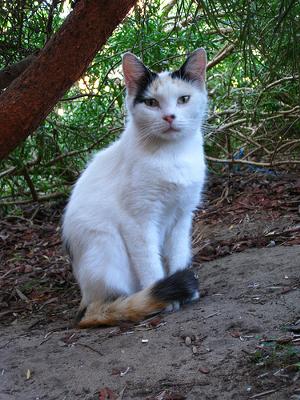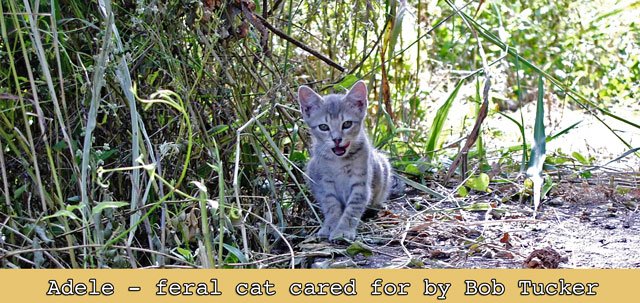The route to properly managing the so-called “feral cat problem” is acceptance, compassion and compromise. Also, the idea of fixing the problem once and for all must be ditched. It is not possible to fix something that is not a problem but a state of affairs. Feral cats should be seen as community cats and should be managed just like anything else that we manage in society.
The concept of compromise with respect to feral cats is essential because opinion in society is very divided about how best to deal with them. The only way forward is to compromise. Not too infrequently we hear of city council members decrying the compassionate efforts of people who wish to try and deal with feral cats in a humane way because the caretakers are enlightened enough to realise that we put the cats there in the first place.

When city councillors criticise attempts to deal with feral cats humanely and even on occasions discuss possible ordinances which restrict the activities of feral cat caretakers they are, in effect, criminalising compassion. It is ironic because we should be praising compassion and supporting it. America is a religious country. Christianity is strong in America. Seventy percent of polled Americans identified themselves as Christians in 2014. Jesus Christ emphasised compassion for others. Where is it with respect to compassionate community cat caretakers?
If the objective is to minimise the number of feral cats, meaning unwanted homeless cats, while at the same time managing them as community cats for the indefinite future, this is about as good as it can get and it is a perfectly good objective. There are many things in society which we would like to get rid of such as uncouth behaviour, gang warfare, drug taking, irresponsible behaviour on the roads, violence against others, theft et cetera but we don’t try and totally eradicate these social issues with a big bang fix. We manage them as best we can and minimise them. We should have that sort of mentality in respect of the feral cat and above all we need to treat them humanely. We also need to get on with it because this issue has been drifting for a very long time in society.

Orange Park in Florida have set up a committee to discuss feral cats and how best to deal with them. The city council did this because they wanted a compromise. They wanted some sort of long-term plan which at least satisfied everybody; the entire spectrum of society. Nobody will be absolutely delighted about the solution but at the same time nobody can criticise such a compromise.
The committee spent eight weeks meeting and researching the scope of the “problem” in Orange Park which has about 1,200 feral cats. The committee looked at how other countries dealt with this problem and the cost of a program and how to get the community behind their proposals.
“The choice is not between having cats and not having cats. The choice is having the “community” population continue to grow unmanaged or to reduce and manage this population” (the report)
As you can see these are the words of compromise. It is not a question of there being no feral cats in the community but about how best to manage them.
In fact, the committee was born out of a councilmember’s proposal to ban the feeding of feral cats which outraged the area animal welfare community. They picketed the town hall about it.
Councilman Steve Howard had proposed banning Orange Park residents from feeding feral or stray cats on residential property they did not own or on non-residential property. He had proposed this because he had received many complaints from residents about feral cat colonies. His idea was one side of the argument but on the other side there are people who found this suggestion totally unacceptable because it would have meant that feral cat caretakers would be faced with the prospect of cats starving to death.
Former councilman Ron Raymond realised that feral cat caretakers have a genuine and heartfelt concern for these animals. That needs to be taken on board when making decisions.

The committee was made up of a diverse group of people from opposite sides of the argument as to how best to deal with feral cats which meant that there were no surprises in their conclusions and that they would inevitably come up with a compromise which should satisfy everyone.
The committee has yet to present its final report to the town council but they have made a couple of sensible proposals namely to establish a volunteer-based TNR program and secondly that people who feed and manage community cats register with the town and limit their activities to their own property or other private properties with the consent of the owner.
“No one is going to love it,” Ron Raymond said. “Both sides got some of what they want.”
This is the only way forward. It is time to put aside differences of opinion in respect of feral cats and find a way forward for the long-term future. Contemplating complete eradication of feral cats is simply pointless, unattainable and cruel. They must be accepted as community cats and part of the fabric of a society that people have created.

There is no turning back in respect of feral cats because things have gone on too long and have gone too far. They are integrated into the ecosystem. Humane management and supporting compassionate caretakers in that task is the best way forward and if these people can be supported with state or county funding to formalise the process so much the better. After all they are doing a service to the community and therefore they should arguably be funded by the community. It is a logical conclusion and New York state agrees with me.
Please comment on Facebook to spread the word. Please click “Also post on Facebook”. Thanks:

Personally, I would let someone use my property for their TNR colony just so I’d have better access to destroy every last one of their cats for them. (Just as I advise everyone to do.) Let them bankrupt themselves sterilizing all their cats, then destroy their cats. 2 birds with one stone that way. The TNR practitioner none the wiser — for that is clearly impossible anyway.
Jim, do you shave your legs before putting on a dress?
So amusing. Methinks you would rethink if you were living beside this caretaker, Woodpecker.
Nice sentiments. But your words will never stop everyone from killing all your unsupervised cats. The more cats you let roam free the more cats that end-up dead. Why is that? Have you ever thought why that is so? I suggest you teach everyone how to keep their cats from getting killed instead. Gee, I wonder how that can be done … I wonder…. It’s so complicated isn’t it. I bet you can’t even think of how to keep your cat from getting killed.
Sally are you Woody in drag again!? It sounds like it. Of course the best solution is for 100% of cat owners to act 100% responsibly 100% of the time indefinitely but that won’t happen so the solution is as stated by me in the article.